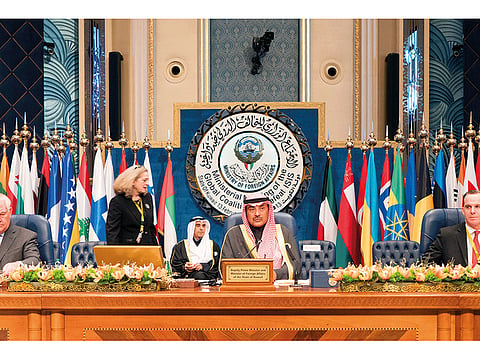Anti-Daesh coalition ‘must keep eyes on prize’
Hostilities between non-coalition actors risk creating new conflict in crowded battle space

KUWAIT CITY: The Trump administration, increasingly concerned that the 74-strong coalition it cobbled together to destroy the Daesh is losing sight of the prime objective, pressed its partners on Tuesday to refocus their efforts, overcome rivalries and concentrate on the task at hand: the eradication from Iraq and Syria of the extremist group.
The alarm US Secretary of State Rex Tillerson sounded at a coalition gathering in Kuwait came with the fight at a critical moment and the mission shifting from offensive military operations to stabilisation.
Distractions are adding up, such as Turkey’s fighting with US-backed Kurdish rebels in Syria and renewed spillover from Syria’s civil war. Meanwhile, hostilities between non-coalition actors — Iran, its proxies in Syria, and Israel — risk creating a new conflict in an already crowded battle space.
“The end of major combat operations does not mean we have achieved the enduring defeat of [Daesh],” Tillerson said.
“[Daesh] remains a serious threat to the stability of the region, our homelands and other parts of the globe,” he said. “Without continued attention and support from coalition members, we risk the return of extremist groups like [Daesh] in liberated areas of Iraq and Syria and their spread to new locations.”
US officials said the thrust of Tillerson’s message was that “eyes have to be on the prize” and anything that hinders Daesh’ defeat will impair broader objectives such as a political transition in Syria that ultimately leads to an end of the war and blunts Iranian behaviour throughout the region.
“It’s complicated enough as it is. Let’s not make it more so,” one official said in describing the administration’s view.
Rising tensions between the US and Nato ally Turkey over Turkish military operations against the Syrian Kurds are a primary concern and Tillerson will end his five-nation swing through the region in Ankara on Friday after stops in Jordan and Lebanon.
Turkey’s foreign minister said Monday that Tillerson’s visit, which follows a similar trip by national security adviser H.R. McMaster, comes at a make-or-break time for relations.
“Our relations are at a very critical stage,” Melvut Cavusoglu said. “Either we will improve ties or these ties will totally break down.”
Ankara is riled over Washington’s support for the Syrian Kurdish People’s Protection Units, or YPG — the top US ally in the fight against Daesh. Turkey considers the YPG a “terrorist” group linked to Kurdish insurgents fighting within Turkey’s own borders.
At the meeting in Kuwait, Tillerson made a point of noting concerns about the situation and urged “all parties to remain focused on defeating Daesh, de-escalating and resolving the Syrian conflict and protecting innocent civilians”.
US officials allowed that Tillerson’s talks in Ankara would be difficult.
But, they maintained — as Tillerson did again on Tuesday — that the United States appreciates Turkey’s legitimate security concerns. However, the officials also stressed that addressing those should not come at the expense of the anti-Daesh mission. If the Syrian Kurds feel threatened, the officials said, they will move their forces away from Daesh fronts, prolonging the fight.
In addition to keeping the fight against Daesh in Iraq and Syria on the front burner, Tuesday’s meetings in Kuwait will also focus on preventing the spread into Europe and elsewhere of retreating Daesh fighters.
Tillerson said the US supports a new blueprint for boosting intelligence and information sharing and law enforcement cooperation to halt the flow of those fighters.
“In Iraq and Syria, Daesh is attempting to morph into an insurgency. In places like Afghanistan, the Philippines, Libya, West Africa and others it is trying to carve out and secure safe havens,” Tillerson said. “We have seen in Iraq and Syria the consequences of an Daesh territorial presence. History must not be allowed to repeat itself elsewhere.”



